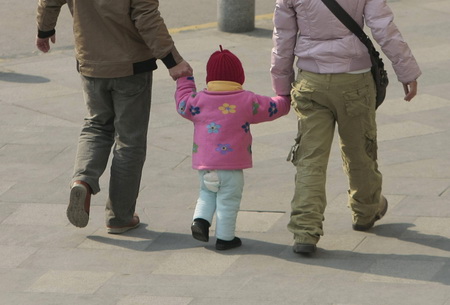Biz Unusual
Non-farm employment impacts on fertility
By Yu Tianyu (China Daily)
Updated: 2010-04-19 09:46
 |
Large Medium Small |
BEIJING -?The number of rural Chinese women's children could be reduced by 0.64 when they are no longer employed in agriculture, a new study showed.
And, her probability of having more than one child also decreased by 54.8 percent.
 |
|
Off-farm female employment affects the fertility of rural Chinese women, according to a paper from the Harvard Kennedy School (HKS) Faculty Research Working Paper Series. [CFP] |
A paper entitled "Female Employment and Fertility in Rural China" found that non-farm employment reduces fertility for rural Chinese women. The findings were based on data collected from 2,288 married women from the 2006 China Health and Nutrition Survey.
Related to Harvard Kennedy School (HKS) Faculty Research Working Paper Series, the paper was co-written by Hai Fang and Karen N. Eggleston of University of Colorado, John A. Rizzo with State University of New York at Stony Brook along with Richard Zeckhauser at Harvard Kennedy School.
China is an important place to study the relationship between employment and fertility, given its rapid pace of economic development, family planning policies, and enormous population. With 1.34 billion people in 2008, China is the most populous nation in the world, according to the National Bureau of Statistics.
The endogeneity-corrected estimates also indicate that off-farm employment reduces the probability of having more than one child by 54.8 percent and the probability of preferring more than one child by 49.6 percent.
The paper authors said that controlling the endogeneity of employment removes the income effect that positively impacts fertility in rural China.
High incomes also allow parents to pay fines if they violate the family-planning policy. "Because collinearity precludes us from including both employment and income (for females) in the same regression, the coefficient of non-instrumented employment includes both effects, which push in opposite directions."
"Once the instrument for employment, the mitigating impact of female income disappears, revealing the strong negative effect of off-farm employment on fertility," the paper said.
For more than 30 years, China has sought to keep the population growth at bay. Although fertility rates had already begun to decline steeply prior to the initiation of this policy, the family-planning policy appears to help plan population growth and reduce fertility rates, said Mark R. Rosenzweig, and Junsen Zhang in "Do Population Control Policies Induce More Human Capital Investment? Twins, Birth Weight and China's "Family-Planning" Policy" published in 2009.
In addition, the effects of fertility on employment may be small. Joshua D. Angrist, and William N. Evans in "Children and Their Parents' Labor Supply: Evidence from Exogenous Variation in Family Size," found that not planning for endogeneity, it overestimates the effect of fertility on labor supply and concluded that fertility per se may have a smaller impact on female labor supply than one might expect.
Given that the government continues to plan population growth, the finding of a causal impact of employment on fertility has important implications as China considers the combination of policies that will sustain its economic development while meeting other goals.
Further improvements in women's education would complement pro-employment policies by increasing the productivity of employment and multiplying its fertility-reducing effects.
The study confirms that off-farm employment for rural women curbs both actual and preferred fertility. Given that economic performance and population size are two critical concerns for a nation, it is vital that this strong negative link be recognized.













